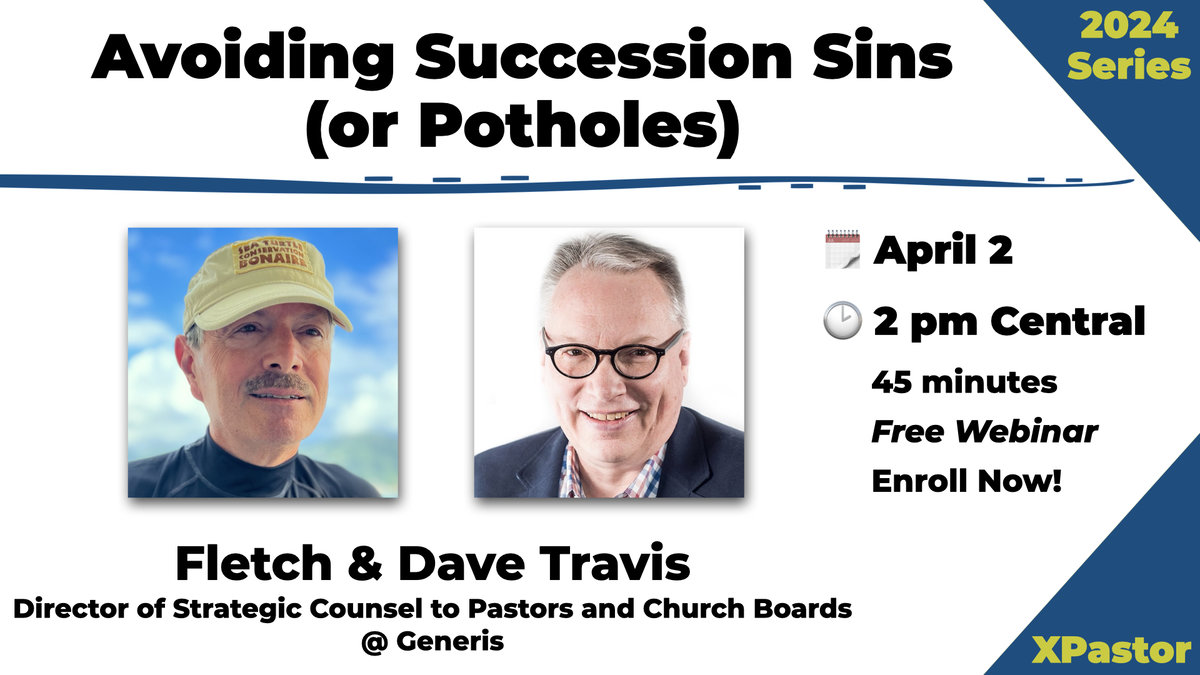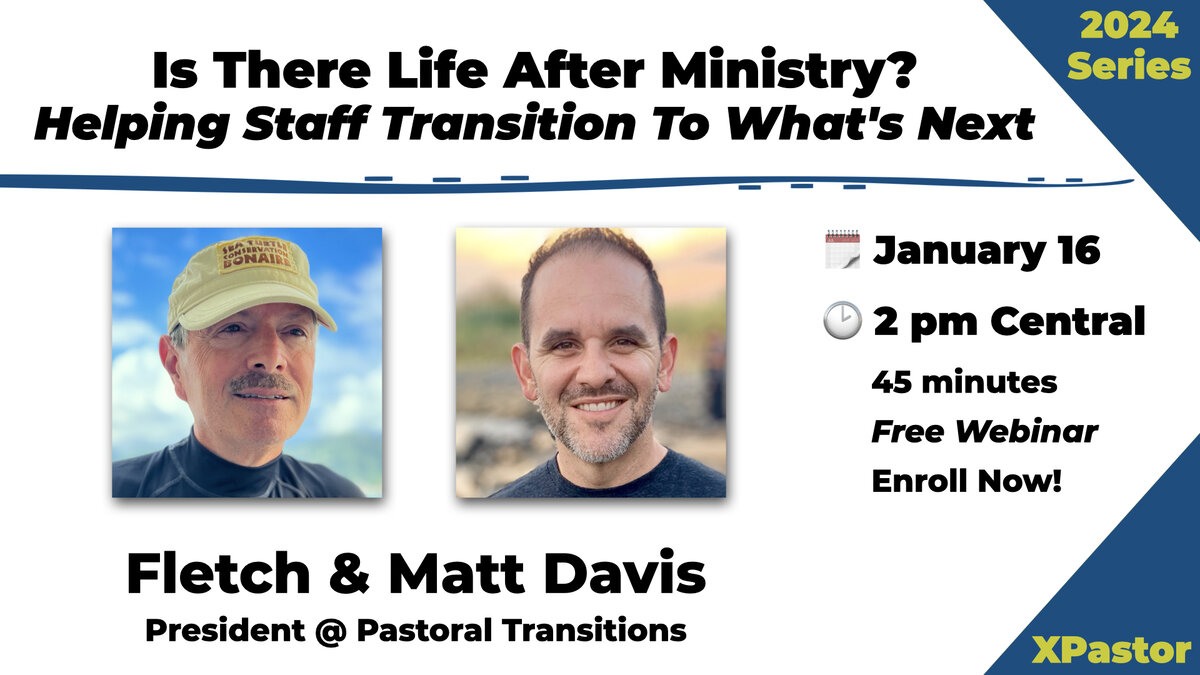Questions to Consider Before and After You Decide to Leave
Feuding Cripples Church— That headline was plastered on page 1 of the city newspaper. By a 17-6 margin, the deacons and trustees had voted the pastor out. But the pastor refused to budge. The board changed the locks to keep the pastor out. The pastor countered with a lawsuit. During one worship service, as the preacher’s supporters escorted him to the pulpit, they were blocked by a wall of detractors who wouldn’t let them by. When a shouting match erupted, 20 policemen were called to the scene. When he finally got to preach, foes heckled the pastor and passed around a competing collection plate.
That’s a sad but true story of what happened to a local church in my state a few years ago.
As a lead pastor or associate staff member, when is it time to leave a church position?
And once you decide to change ministries, how should you leave?
What can you do to make the transition easier for the next person who assumes your position?
To make sure your situation never merits adverse media attention, mull over the following suggestions. Allow the questions I pose to serve as a catalyst for your own thinking. Even if you don’t agree with all my conclusions, asking yourself the right questions is integral to leaving a church position well.
Before You Decide To Leave
Why does another job appeal to me?
All the ways of man are clean in his own sight, but the Lord weighs the motives (Prov. 16:2). If the new opportunity paid the same and didn’t promise to escalate my reputation among peers, would it still pique my interest?
Where can I contribute most to the kingdom of God?
How has the Lord put me together to minister in His name? Does the new opportunity allow expanded utilization of my background experiences and ministry strengths? Does the group I currently serve need abilities I don’t posses or a leadership style that’s foreign to me?
Who can help me sort through this decision?
Without consultation, plans are frustrated, but with many counselors they succeed (Prov. 15:22). To apply the principle of multiple counselors, look for people with objectivity from outside your congregation or organization. Consult those with ministry experience who have sparred with similar decisions. Select individuals who know you well, who are familiar with the strengths and weaknesses of your temperament, as well as with your distinctive leadership capabilities.
Am I tempted to resign due to recent criticism, or an emotional low following an unusually demanding phase of ministry?
There’s nothing wrong with feeling like resigning, just don’t let negative emotions or temporary exhaustion result in an impulsive departure. If you avoid interpersonal conflicts or unpleasant confrontations now, copping out could become a pattern in your life. Then you’d never reap the benefits of a long stay in one place. If you are too physically or emotionally spent to continue, ask for a sabbatical before making an abrupt change of address.
How will a change affect my spouse and children?
Involve them in the process of praying and weighing the pros and cons. When you interview at a new location, ask permission to take your entire family.
Am I finding it more difficult to follow the lead of my senior pastor or supervisor?
Am I chomping at the bit to change things in the church over which I have little control? Is my loyalty to the group’s leadership or its direction waning? God doesn’t direct associate staff members to stay on the scene and recruit supporters for their particular agendas.
What effect will my departure have on the health of people and programs I leave behind?
Who will pick up the slack in fulfilling my most essential responsibilities? Have I trained others to teach, to plan a retreat, to chair a committee and to recruit volunteers? Perhaps the greatest indicator of your leadership effectiveness is how the people you served prosper in the months following your resignation.
Will leaving now result in broken promises or short-circuit the accomplishment of specific ministry goals?
O Lord, who … may dwell on thy holy hill? He who … swears to his own hurt, and does not change (Psa. 15:1, 4c). God’s Spirit normally doesn’t lead a Christian education associate to leave in the middle of a program evaluation or attendance drive that he or she instigated. Nor does He nudge a youth pastor to grab the lure of a larger church offer after promising his tenth graders he would stay through their high school graduation. Nor does He usually tell a pastor to accept an unexpected call elsewhere soon after he promised to chair next year’s city-wide crusade or in the middle of a fund-raising campaign that he launched in his own congregation.
If those questions don’t provide a resolution to your dilemma, you can always ask the Lord for a clear-cut sign. Tell Him you’ll resign the day the church board changes the lock to your office, or the Sunday that ushers pass around a competing collection plate in the middle of your sermon!
After You Decide to Leave
Mull over these questions once you know that God is leading your elsewhere.
Who should be the first person to know that I’m resigning?
The correct answer to this question may vary, depending on a church’s organizational chart and the person or group to whom you are most accountable. In most cases, a lead pastor will first inform the ruling board to whom he is accountable. An associate staff member who reports to the lead pastor will inform the pastor first, before sharing the news with friends in the congregation.
A regret I have is that I once told a friend in the church, as well as the chairman of the church board, that I was resigning as the Director of Christian Education before I informed the lead pastor, to whom I reported. Because of our past history and his strong temperament, frankly, I feared him. He came to talk to me when he read the letter I had given the board chairman. I could tell he was hurt.
Apart from my wife, no one else in the church should have known I was leaving before the senior pastor, with whom I met on a weekly basis. I disrespected him as a person and his position as the pastor. Later I apologized to him about this, but the damage had been done.
We can’t keep our integrity and avoid the hard conversations. It’s a similar mistake when a young man breaks up with his girlfriend with a text. Or a leader sends an assistant a reproof via email rather than meeting face to face.
How can I facilitate a smooth transition to my successor?
Ask members of your church’s ruling board, other staff members and lay leaders who you supervise questions similar to these: What do you need from me during these next few weeks? What information or training will keep things running smoothly until my successor arrives?
Prepare a notebook for your successor, chock-full of program information, office procedures and policies integral to the job description. Think of ways to save this person time. Think back to what you wish you had known when you first arrived on the job.
Also leave your successor the names and contact information of other leaders in your geographical areas who you respect and from whom you’ve benefited. If you’ve profited from the friendships with or mentoring of other lead pastors, youth ministers, Christian education associates or parachurch leaders, such contacts might prove invaluable to someone new to the area. If you’re the lead pastor, and there isn’t an associate capable of regular pulpit supply, give names and contact information of men in your area who are qualified to feed the congregation from God’s Word. I know elders in multiple churches who struggled to obtain qualified speakers after their pastor resigned.
How long should I remain in the church and community?
If you’re an associate, ask the lead pastor for input on how long you should serve after a resignation is announced. For lead pastors who are usually much more visible to the congregation, the consensus among experienced churchmen is not long—perhaps a month or a little more. Severing formal ties quickly expedites acceptance of your successor and minimizes inevitable comparisons that people will make.
In a Leadership Journal article to lead pastors, Donald Bubna also cautioned against frequent visits to the previous congregation, especially during the first couple of years. He says it’s a professional courtesy to return only with the prior awareness and blessing of the new pastor or associate. A close friend who pastored a church for 18 years left for a different kind of ministry out of state, yet prior to the first time he visited the area a couple of years later, he called the new pastor to determine if he was comfortable with his visit.
Whether you’re riding a wave of popularity when you leave, or you’re forced to resign due to irreconcilable differences, how you leave a position says a lot about your character.











